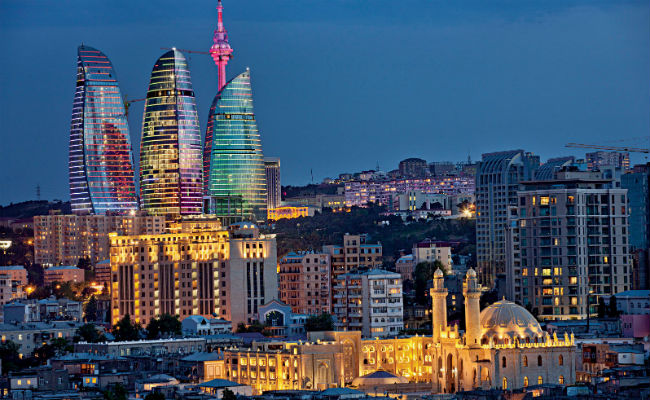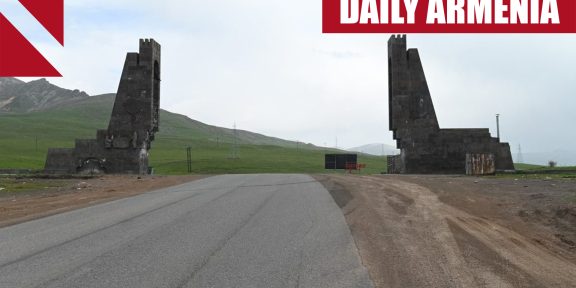 A new era of low oil prices will have profound repercussions for Azerbaijan, which over the past decade has spent a large chunk of its crude export revenues on transforming the capital, Baku, into a glitzy metropolis and beefing up its military.
A new era of low oil prices will have profound repercussions for Azerbaijan, which over the past decade has spent a large chunk of its crude export revenues on transforming the capital, Baku, into a glitzy metropolis and beefing up its military.
Energy Intelligence, a New York based company specializing in energy issues has published an article titled, “Azerbaijan: Trouble Ahead” in its weekly magazine Energy Compass. The article explains how low oil prices will affect Azerbaijan’s oil and gas dependent economy.
A new era of low oil prices will have profound repercussions for Azerbaijan, which over the past decade has spent a large chunk of its crude export revenues on transforming the capital, Baku, into a glitzy metropolis and beefing up its military — perhaps in the hope, one day, of recapturing territory lost to Armenia in the early 1990s. So far, there are no signs of panic in the 900,000 barrel per day Caspian producer, but the financial crisis unfolding in neighboring Russia is causing some unease (EC Nov.28’14). And the longer the slump in oil prices persists, the more pressure the government will be under to cut spending, especially on defense, and sacrifice some of the more ambitious investment schemes being planned by state oil company Socar.
On the surface, there is little for Azerbaijan to worry about in the near term, even if oil prices were to dip below $50 per barrel, as some analysts predict. The country will still receive its entitlement of around 500,000 b/d of high-quality crude from the BP-led Azeri, Chirag, Guneshli (ACG) project that is piped to the Turkish Mediterranean port of Ceyhan. Additional revenues come from the sale of 6 billion- 7 billion cubic meters per year of gas to Turkey from another BP-operated field, Shah Deniz. “It’s business as usual here, and the mood is still pretty upbeat,” a Western oil executive in Baku says.
Azerbaijan’s economy is also bolstered by the money that has built up in its oil fund that was established in 2000 to cushion the effect of a sudden drop in oil prices — as is happening now. There is currently around $37 billion sitting in the fund, mostly in dollars, and in a sop to greater transparency the government publishes the fund’s accounts every quarter.
But analysts say the financial defenses are not as strong as they appear, and the government has had to dip into the savings on a regular basis to fund various projects — including Azerbaijan’s 25% stake in the Baku-Tbilisi-Ceyhan oil pipeline; the $5.8 billion Star Oil refinery in Izmir, Turkey, that Socar is building; and a giant new petrochemical complex on the shores of the Caspian Sea being built and bankrolled by Socar, which could cost more than $10 billion.
The outflows from the fund are set to balloon in the coming years, as more big-ticket energy projects move into gear that Socar is unable to finance from its own coffers. By far the largest is the so-called Southern Gas Corridor — a project costing more than $25 billion that involves involve building a new gas pipeline system across Turkey, the Trans Anatolian Gas Pipeline, plus the Trans Adriatic Pipeline running from Greece to Italy. All of the gas will come from the Shah Deniz project, in which Socar holds a 10% interest. Socar’s share of the overall costs is likely to be well in excess of $10 billion, sources familiar with the project say, with the oil fund providing most of the money.
Socar Almighty
Socar, which is sometimes referred to as a “state within a state,” is one of the world’s most powerful national oil companies (NOCs). It produces, refines, and trades oil, and at the same time negotiates production-sharing agreements and gas supply deals with foreign companies such as a BP and Total. It also manages an overseas asset portfolio which includes oil terminals in Georgia and the United Arab Emirates and filling stations in Switzerland. A 66% stake in Greek state gas pipeline company Desfa is also in the works.
Where Socar lags behind some other NOCs is in transparency, although the company has taken some steps to make its dealings less opaque. For instance, until recently its Geneva-based marketing arm, Socar Trading, was 50% owned by two offshore entities in Dubai and the British Virgin Islands whose beneficiaries remain a mystery. Questions have also been asked about why Socar has so many offices around the world — among them two in Dubai and one each in Lagos, London, Washington, Istanbul and other cities, some of which do not appear to do much business. Socar has also failed to explained why it sells so much of its oil to two companies in Singapore, Coral Energy and Petro Singapore, which have been in existence for less than five years.
BP, as the dominant foreign player in Azerbaijan for more than 20 years and likely another 20 as Phase 2 of Shah Deniz comes to fruition, is the oil company that knows Socar best. But it has not been the easiest of relationship (EC Feb. 4’11). BP has pressed Socar and the government for years to extend the ACG production-sharing contract beyond its expiry date of 2024, arguing that billions more barrels could be recovered, but to no end. Azeri President Ilham Aliyev, himself a former vice president of Socar, has also criticized BP in public for failing to abide by its commitments at ACG, where production has fallen well short of its targeted 1 million b/d plateau. Aliyev will not have been thrilled at BP’s recent announcement that it will reduce its expenditure in Azerbaijan as part of a global cost-cutting drive. But if the oil price slump persists, then this is something he will have to do himself.
Paul Sampson, London
Compass Points
- SIGNIFICANCE: With oil and gas revenues accounting for over 50% of GDP, the 900,000 b/d Caspian producer will be hit hard by a prolonged slump in oil prices. State oil company Socar will have to rein its spending and may struggle to finance future pipeline and refinery projects.
- CONNECTION: The sharp rise in military spending has fueled concerns that Azerbaijan may launch a campaign to recapture territory occupied by neighboring Armenia. Analysts say this would spell disaster, not least because Russia would almost certainly side with the Armenians.
- NEXT: The government trims its budgets for next year, and Socar is advised to be more watchful with its spendings as oil prices fail to recover.
















